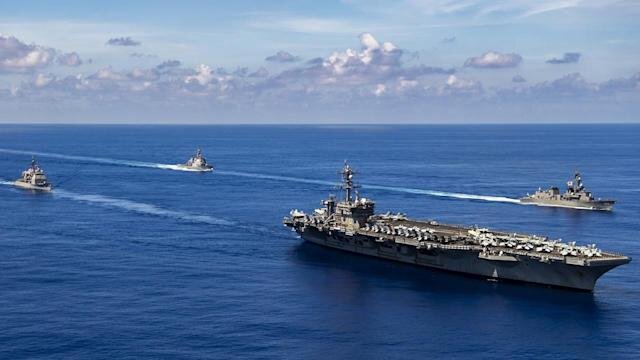Mohammad Javad Qahremani told the Strategic Council on Foreign Relations that the Russian Navy said in a statement that the USS Chaf destroyer was entering its territorial waters on Friday 15 October with numerous warnings and eventually as the Russian naval warship approached, the USSR was forced to change course.
He said Russian statement considers this move by US navy as a violation of international regulations and the 1972 agreement between Moscow and Washington to prevent air and marine clashes.
“This is the second time in recent months that Russia has said it has pulled a NATO warship out of its waters; In June, after a British ship approached a Crimean port, Russia retaliated by firing. Also in November 2020, Russia announced that the US destroyer USS McCain had moved away from Peter the Great Gulf- where Russia considers it its territory but the United States considers it international waters”.
Asked about the US reaction, he said the US Navy said in a statement that the ship’s departure was a continuation of its regular operations and in accordance with international law and custom, although a broader look at the developments clearly shows the complex nature of the situation.
Qahremani said the recent incident happened at a time when China and Russia were conducting military frills in the Sea of Japan, saying “this maneuver is a continuation of the extensive military cooperation between the two countries in recent years. In recent years, the two countries have conducted joint air patrols in the East China Sea and the Sea of Japan. However, what sets the recent maneuver apart from previous maneuvers and collaborations is that Beijing has for the first time sent its new Nanchang 055 destroyer for joint exercises.”
He said “in addition, following the end of the joint Sino-Russian military maneuver, the Japanese government for the first time confirmed that Chinese and Russian forces had crossed the Tsugaro Strait, which connects the Sea of Japan to the Pacific Ocean. Although, according to Japan, this is not a violation of international rules, it shows the growing coordination between China and Russia.”
Asked about the presence of the US in the region, he said “the United States, as a trans-regional power, is currently expanding its efforts to establish more military presence in the region and is completing military activities in the region. The Aukus agreement between the United States, Britain and Australia can be seen as the culmination of the country’s efforts to cooperate militarily with allies in the Asia-Pacific region. In addition, Washington has conducted numerous maneuvers in recent years in sensitive areas for countries in the region”.
He stressed that in addition to the Sea of Japan, US-Russian relations are being strained in other areas as well, and this has created the ground for closer cooperation between Russia and China. However, although the recent maneuver of the two countries is a warning to Japan, but the level of partnership between the two countries can not be considered equal to the US-Japan alliance. An important factor is US pressure, which plays a key role in strengthening military cooperation between Russia and China.
Referring to the scope of relations between Moscow and Washington considering the recent tensions, he said “although the presence of the US destroyer near Russia’s territorial waters can be seen as an attempt to test Russia’s seriousness and on the other hand to declare its readiness against Moscow and Beijing, this action, along with other military developments, could increase the level of crisis in bilateral relations. On the one hand, the country should be accompanied by the further development of Chinese-Russian military cooperation. Ultimately, an increase in the level of crisis in relations between the two countries can lead to both possible confrontation and cooperation. However, US-Russian relations are not in such a state at the moment”.










0 Comments